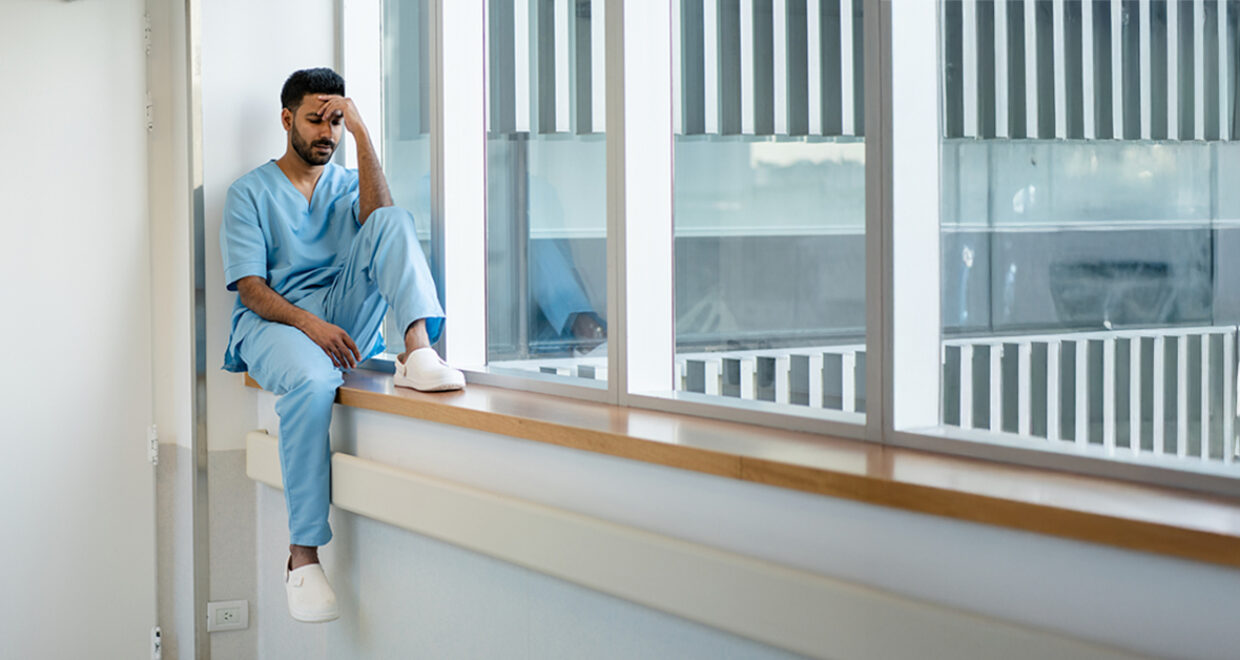What We Learned About Burnout in Oman’s New Doctors, And Why Emotional Intelligence Matters (But Isn’t Everything)
The RCPsych Article of the Month for May is ‘Prevalence and predictors of occupational burnout among first-year medical residents in Oman: the role of trait emotional intelligence‘ written by authors Dr. Salim Al-Huseini and Dr. Nagina Khan and published in BJPsych International. The blog is written by author Professor Salim Al-Huseini, and Nagina Khan.
In our study published in BJPsych International, we explored the prevalence and predictors of occupational burnout among first-year medical residents in Oman, with a particular focus on the role of trait emotional intelligence.
When we think of new doctors, we often picture hopeful and enthusiastic fresh graduates stepping into hospitals, eager to make a difference. Then what happens when the reality of long shifts, emotional intensity, and relentless clinical pressures sets in?
This concern led us to investigate burnout during this critical early stage of medical training.
Burnout among junior doctors is well documented globally, but in Oman, there was little local data on its prevalence or the personal and professional factors that might influence it. We sought to answer two key questions: How common is burnout among first-year residents? And does emotional intelligence help protect against it?
We sought to investigate further: Who is most at risk?
Our findings revealed that burnout is indeed prevalent. Over one in four residents (25.8%) reported high overall burnout, with emotional exhaustion (57.5%) and depersonalisation (50.8%) particularly common. Nearly half felt a low sense of personal achievement.
We sought to investigate further: Who is most at risk? Interestingly, age and marital status emerged as significant factors. Older residents experienced more depersonalisation and reported feeling less accomplished. Married residents reported significantly higher levels of emotional exhaustion perhaps reflecting the challenge of balancing demanding work hours with family responsibilities. Given the high proportion of female residents in Oman, cultural expectations and gender roles may also shape how burnout is experienced and expressed. These nuances must inform future support strategies.
What about emotional intelligence? Does it offer any protection?
We found a small but meaningful correlation between emotional intelligence and personal achievement: those with higher scores, especially in well-being, felt more accomplished. However, emotional intelligence did not significantly reduce emotional exhaustion or depersonalisation. In other words, while it helped residents feel better about their work, it wasn’t a complete buffer against burnout.
This finding challenged our assumptions. Emotional intelligence is often celebrated as a resilience factor, but burnout is more complex. It involves individual capacity for emotional regulation, yes, but also systemic issues: organisational culture, workload, mentorship, and life pressures beyond the hospital walls.
To effectively support early-career doctors, we must adopt a broader, more compassionate approach one that prioritises not only individual resilience but also workplace wellbeing. Our study is a small but vital step in understanding how best to nurture and protect Oman’s future healthcare professionals.
Occupational burnout, a state of physical, emotional, and psychological exhaustion, has been recognized as a significant factor affecting healthcare professionals, including medical students and specialty trainees. The risk of experiencing burnout seems to vary depending on sociodemographic variables and personal attributes including emotional intelligence. In their very interesting paper, Al-Huseini and colleagues, explored the prevalence of occupational burnout among first-year medical residents in Oman, and investigated the relationship of different sociodemographic characteristics and aspects of trait emotional intelligence with three dimensions of burnout including emotional exhaustion (EE), depersonalisation (DP), and personal achievement (PA). They identified a high overall burnout rate, at 25.8%, with 57.5% of residents reporting high levels of EE, 50.8% high DP, and 49.2% a low sense of PA. Age was positively associated with DP and low sense of PA, being married was positively associated with EE, whilst high family income and surgical residency were positively associated with burnout. A positive association was also found between PA and the well-being aspect of emotional intelligence. This study adds to the growing body of knowledge on the correlates of burnout among young doctors in the Arab Gulf region, with a particular focus on the role of emotional intelligence, and offers insights that may have broader applicability.
Marinos Kyriakopoulos
Editor-in-Chief, BJPsych International






